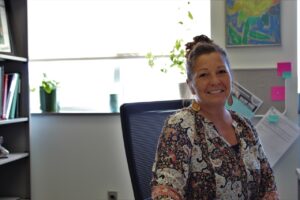
In response to growing internship partnerships, MCCC has created a new position called the Experiential Learning Coordinator.
MCCC is currently in partnership with 17 employers , with a collective 42 interns enrolled in classes.
“There is a need for skilled trades and apprenticeships,” said Kristina Henry, the new Experiential Learning Coordinator.
In order to have an officially registered apprenticeship, you have to have three components; an employer as a sponsor, a schedule of curriculum and wage progression, Henry said.
Structured curriculum is where MCCC can be involved.
“MCCC is equipped with the training materials and classes in a way that any sponsor who has a master employee, no matter the field, can set up an apprenticeship program along with grant funds” said Henry. “There’s so much grant money that can help a company grow and expand and get trained, skilled journeymen.”
It is the job of the Experiential Learning Coordinator to introduce these opportunities to companies.
When the internship program was first taking off, an Administrative Assistant managed the apprenticeship program.
Seeing the success and potential the program has shown, Parmeshwar Coomar, dean of the Applied Science and Engineering Technology Division, created the Experiential Learning Coordinator position to manage and build the program.
Henry said her focus for the budding program is networking, recruiting and enrolling.
By being a link in this education initiative, MCCC assists in convenient career progression.
Jessica Poniatowski, an electrical apprentice for Ford, has been taking classes at MCCC since October 2020 as part of her training.
“School is helping me understand more of what I’m doing while I’m at work,” Poniatowski said.
Apprenticeships are based on mentorship and are profitable to students because they offer the hands-on work experience that employers look for when hiring.
Poniatowski said she never used the bachelor’s degree in advertising she earned out of highschool. Instead, at 35 years old, she is now going into the electrical trade after being on Ford’s apprentice waiting list for 4½ years.
The majority of the apprentices working in the skilled trades are not young adults out of highschool, but adults who have families and additional responsibilities.
“Going into the skilled trades is just something that I’ve always wanted to do, so the fact that it is provided for me is a big deal,” said Poniatowski. “It means a better future for me and my daughter.”
Building the Apprenticeship program is part of MCCC’s strategic plan, Coomar said.
It’s why the Experiential Learning position was expanded, Coomar said. MCCC is in the process of making a handbook outlining the responsibilities of apprentices, MCCC, and sponsors.
The current apprentices and employers using MCCC as their curriculum learning site are based in the science and technology fields Henry said. In the future she hopes to see apprenticeship sponsors in new industries.
“With apprenticeships on the rise, MCCC can be a great resource for job seekers and employers in our community,” said Henry. “I am bringing them together.”

